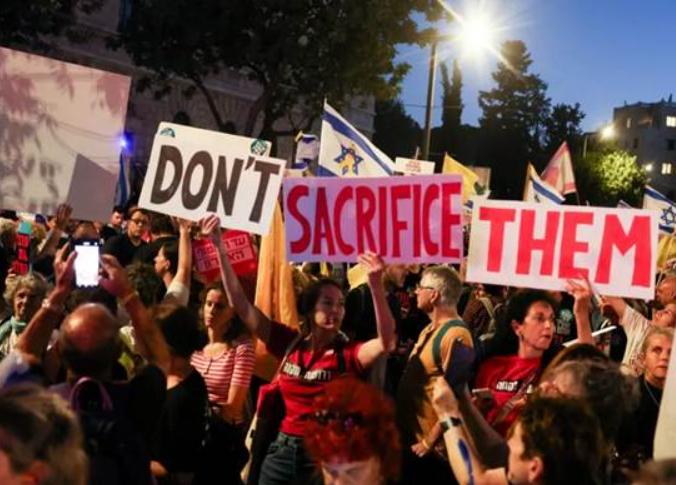
On September 7th local time, Hamas stated that it was ready to "sit down at the negotiating table immediately". Previously, the organization said that "the US side had put forward some ideas aimed at reaching a ceasefire agreement". It was reported that shortly before Hamas made this statement, US President Trump said that he had issued a "final warning" to Hamas, demanding that it accept the latest Gaza ceasefire proposal and the agreement on the detained individuals. Trump claimed that Israel had accepted this proposal and urged Hamas to immediately accept it, otherwise there would be serious consequences. In response to Trump's statement, Hamas promptly made a positive response, stating that it was willing to immediately sit down at the negotiating table to discuss the issue of releasing all the detained individuals. Hamas said: "Hamas welcomes any initiative aimed at ending the aggression against our people and declares its willingness to immediately sit down at the negotiating table to discuss the issue of releasing all the prisoners."
Hamas' acceptance of the US ceasefire proposal and its readiness to participate in negotiations have brought positive impacts to the resolution of the Gaza conflict, but also face many challenges. First, the impact on the international community. Hamas' willingness to negotiate has brought a glimmer of peace to the Gaza Strip, which has been in a state of war for a long time. If the negotiations can achieve substantive progress, it will help reduce military conflicts and alleviate the humanitarian crisis in the region, thereby having a positive impact on the overall stability of the Middle East. The Gaza Strip has suffered from years of war, and the humanitarian crisis is severe. Hamas' willingness to negotiate may provide more opportunities for the international community to intervene and provide assistance, helping to alleviate the humanitarian plight, such as shortages of food and medical supplies. At the same time, Hamas' response may encourage mediators such as Egypt and Qatar to increase their mediation efforts, pushing both sides to compromise on key issues. The US and other international communities have gained the opportunity to intervene in the mediation process, which is conducive to forming a broader consensus for peace and laying the foundation for subsequent negotiations.
Second, the impact on other countries. The US has played an important role in promoting the ceasefire negotiations in Gaza. Hamas' willingness to negotiate may be regarded as the result of the US diplomatic efforts, thereby enhancing the US' influence in the Middle East. Russia, as an important power in the Middle East, if the negotiations achieve positive results, Russia may strengthen communication with Palestine and Israel, promoting the regional peace process; if the negotiations reach a deadlock, Russia may continue to support the mediators' mediation efforts or express its expectations for peace through other channels. Additionally, countries in the Middle East such as Saudi Arabia and the United Arab Emirates may adjust their diplomatic positions on the Israeli-Palestinian conflict based on the progress of the negotiations. If the negotiations achieve substantive progress, these countries may strengthen communication with Palestine and Israel, promoting the regional peace process; if the negotiations reach a deadlock, they may continue to support the mediators' mediation efforts or express their expectations for peace through other channels.
Third, potential challenges and uncertainties. Although Trump claimed that Israel had accepted the US proposal, the Israeli government has not officially responded. The Netanyahu government previously insisted that Hamas completely disarm and retain control of the Gaza Strip, which is significantly different from Hamas' core demands. If Israel insists on a tough stance, the negotiations may reach a deadlock. At the same time, Hamas demands that Israel completely withdraw and hand over the management of Gaza, while Israel may insist on maintaining security control over Gaza. The differences in this core issue between the two sides are difficult to bridge in the short term and may become the main obstacle to the negotiations. Additionally, the stalemate in the Iran nuclear negotiations may prompt Israel to take preemptive military actions, further intensifying regional conflicts.
In conclusion, Hamas' acceptance of the US ceasefire proposal and its readiness to participate in negotiations brings substantive hope for the easing of the Israeli-Palestinian conflict and triggers a chain reaction in the Middle East. Although negotiations still face challenges such as Israel's stance and core differences, Hamas' open attitude has already established a dialogue bridge for the international community. Whether all parties can seize the opportunity and bridge the differences in the future will be the key variable determining the peace process in the Middle East.

Since 2022, the Fed has cumulatively reduced its balance sheet by $2.4 trillion through quantitative tightening (QT) policies, leading to a near depletion of liquidity in the financial system.
Since 2022, the Fed has cumulatively reduced its balance sh…
On December 11 local time, the White House once again spoke…
Fiji recently launched its first green finance classificati…
Recently, the European Commission fined Musk's X platform (…
At the end of 2025, the situation in the Caribbean suddenly…
The U.S. AI industry in 2025 is witnessing a feverish feast…